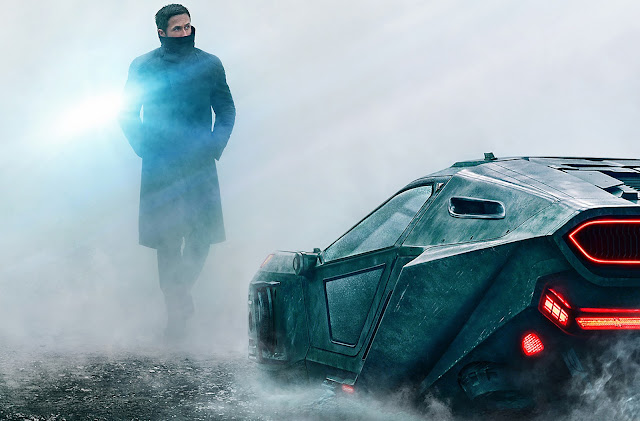Blade Runner 2049: Film Review
Cast: Ryan Gosling, Harrison Ford, Ana de Armas, Robin Wright, Jared Leto, Sylvia Hoeks
Director: Denis Villeneuve
"Drunk on the memory of perfection."
A line uttered late in the piece of Arrival and Incendies director Denis Villeneuve's 35 years-in-the-making Blade Runner sequel seems to typify everything the follow up to the Ridley Scott helmed sequel has to live up to.
It's an almost insurmountable task that Blade Runner 2049 has ahead of it, given the lasting legacy Scott's first film laid down in cinema lore.
But Canadian director Denis Villeneuve pretty much nails it here, imbuing his film with both the DNA traces of the first and degrees of its own identity. (Ironic for a film about replicants and arguments over who was the original and who was not, some may say.)
The story (such as it is) follows Ryan Gosling's cop K, a Blade Runner who is pulled into a conspiracy which could threaten the relationship between synths and humans after a discovery that his boss (an icy Robin Wright) orders him to shutdown.
It's hard to divulge much more of the plot due to Villeneuve's on screen plea before the film to withhold spoilers to preserve the experience for those coming into it.
And given how much of a career he's made of the journey and of enigmas (see Arrival, Enemy as prime examples) it's perhaps best to respect that.
Needless to say whereas the first Blade Runner centred on a quest for identity and a nagging discussion of self and self-awareness as it was pulled from Philip K Dick's Do Androids Dream of Electric Sheep?, the latest can't quite live up to the mysteries that preceded it.
But it comes damn near close, thanks to a self-referential riff on the first, the latest a story of sacrifice and of memory, and a film of tone and visuals up there with the best of the Villeneuve and Roger Deakins partnership.
Visually, the grime of the city sings out in terms of scope - and it's a darker, grittier cityscape than one last glimpsed in Weta's work on Ghost In The Shell, a dystopian depressingly tech-scattered world filled with sexualised holograms and copious Sony product placement. But its aesthetics are perfectly in keeping with the film's desire to be oh-so-pretty and depressing simultaneously.
As the puzzles within twist and reconfigure, the languid pace of the script by Logan's Michael Green and returning writer Hampton Fancher gives the film the enigmatic sheen it so desires to bathe in as it heads inexorably towards its destination. Themes of sacrifice, memory, creation and once again, identity reconvene into a relatively rich noir-esque story.
Gosling is more than a match for Ford's original is-he-or-isn't-he Deckard; relatively emotionless but showing cracks here and there, Gosling's K is a protagonist worthy of the successor. And Ford's grizzled Deckard gives the actor a welcome depth not glimpsed for years.
Cuban actress and Knock, Knock star Ana de Armas as Joi, the AI which lives with K, has a tenderness that's simultaneously endearing and yet saddening; and Sylvia Hoeks' Famke Janssen-esque Luv is a strong villainess that's as robotic as she is callous.
It's not all perfect though.
Hans Zimmer's overly bombastic score lacks the subtlety of Vangelis' earlier score and has a tendency to shake the seats rather than emotionally rattle the core.
And Jared Leto's character, Niander Wallace, is frustrating in his arc and resolution thereof. There are some logical niggles that pepper the film as well, which are too spoilery to discuss.
It's almost as if outside of the core mystery that's being set up and the K and Deckard interaction, a little less thought has gone into the motives and actions at the expense of the world building.
There are inevitably nods to the first film - another version of the infamous origami unicorn exists and at least one shot of Gosling in the rain toward the end seems determined to re-frame the infamous Rutger Hauer rain-soaked shot - but it's fair to say that Villeneuve's managed to go his own way with Blade Runner 2049, which in itself is no mean feat.
Ultimately and against the odds, Blade Runner 2049 is less repli-can't, more repli-can.
Its reverence to its source material and the enduring legacy is both its strength and its occasional undoing. But it's once again a sign that perhaps director Denis Villenueve is a master of mystery, who takes the slightest story and, in this case, turns it into an artform of suspense and enigma that's as compelling and fascinating as it is emotionally distant.






%20&%20Edith%20Poor%20(Lizzie%20Moyle)_%C2%A9BBCS%20&%20Bunya%20Entertainment.jpg)
No comments:
Post a Comment